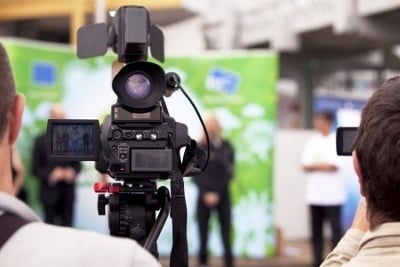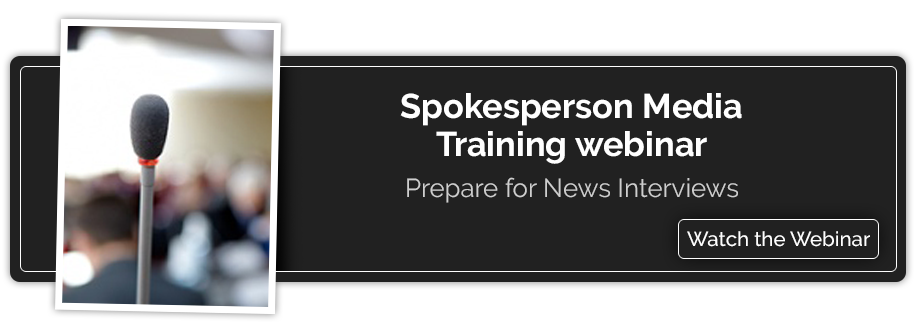 Tips for pulling off a great television news interview
Tips for pulling off a great television news interview
During a TV news interview, the audience can see and hear you, which presents a unique set of challenges. Preparing for how the viewer will see you helps ensure that your audience hears your message clearly. Here are a several “inside tips” that we give our clients to help them master their television interviews:
General pre-interview tips
-
Watch other people being interviewed on TV with the sound off.
-
Watch the expert TV reporters and take note of their posture.
-
Review your notes and talking points before coming to the studio.
-
Appear relaxed on camera by doing breathing and stretching exercises (vocal, mouth and body) right before the interview.
-
Be prepared for the reporter to want background shots of you in your work environment.
-
Never assume the camera isn’t recording just because the light is off.
-
Don’t bring more than one person with you to a TV studio unless specifically instructed otherwise.
Non-verbal elements
-
Smile and be animated when appropriate.
-
Maintain eye contact with the reporter.
-
Never look directly into the camera.
-
Don’t watch yourself on a monitor – it’s distracting.
-
Don’t lick your lips, squint, roll your eyes or excessively blink.
-
Allow your head to move naturally as you speak.
-
If you’re with a host who’s ripping you apart, don’t be afraid to sit closer and briefly touch his or her arm and smile – it will make it harder for him/her to be nasty to you.
Verbal elements
-
Think in terms of communicating with people in their living rooms.
-
Be polite.
-
Keep sentences brief – think sound bites.
-
Avoid “uh,” “um” and “OK.”
-
Avoid jargon and acronyms.
-
Speak distinctly at your normal volume and be sure to naturally vary pitch and pace.
-
If you don’t know the answer to a question, say so and try to weave in an appropriate key point.
-
Don’t waste time with phrases like “as I mentioned earlier.”
-
Don’t drop or increase your volume at the end of a sentence.
-
Be careful about popping your p’s into the microphone. (When your mouth forms a p, it causes a forceful gush of air that can explode into the microphone. This is jarring and unpleasant to listeners and viewers.)
Posture points
-
Sit up straight.
-
Sit on your jacket.
-
Don’t lean or swivel.
-
Keep your feet flat on the ground or cross your legs toward the interviewer.
-
Don’t tilt your head to one side – it communicates uncertainty.
-
Remain immobile below the neck – do not gesture with your hands.
-
When sitting at a desk, lean slightly forward, place your forearms on the table and clasp your hands.
-
When sitting in an armchair, lean slightly forward.
-
When standing, place your feet about 12 inches apart, one leg slightly in front of the other, and either let both arms drop to the side or bend one arm 90 degrees at the elbow. Do not lock your knees.
Appearance matters
-
Avoid three-piece suits; intricate patterns; large, shiny jewelry; and the color black.
-
Wear solid colors, a jacket or long sleeves and a tie in a strong (but not distracting) color.
-
Leave your glasses off if you can.
-
Keep your hair out of your eyes.
-
Be clean-shaven unless bearded. If you do wear a beard, keep it neat and well-trimmed.
-
If you are bald or balding, powder your head so it doesn’t shine.
-
Keep your jacket buttoned. This will keep your tie in place and your suit symmetrical.
-
Make sure the makeup you use is the same color as your skin, neither lighter nor darker.
Remotes (earpieces)
-
Don’t touch the earpiece unless it falls out. Test audio levels before starting; alert the producer immediately if the earpiece doesn’t stay in your ear easily.
-
If you’re wearing an earpiece and you lose the volume during a live broadcast interview, quietly state your name and say that you can’t hear anything. The producer should be able to hear you and make the necessary adjustments.
Post-interview reminders
-
When the interview is over, sit still until the producer or host tells you that you’re done and that you may leave the set.
-
If you want to improve your TV performances, watch, review and critique your entire TV interview within 24 hours of the show airing.
TV interviews with other guests
-
Don’t let other guests hijack the agenda.
-
Disagree firmly but always politely.
-
Don’t get into a heated discussion on the air – remember the viewer.
-
Speak directly to the other guests rather than speaking to them through the host.
-
Affirm positive questions: “I’m glad you asked that...” or “That’s a good question...”
Practice makes perfect when it comes to having a successful interview. Ask a friend to interview you while you tape yourself or just watch and critique other interviews on TV.
Axia Public Relations is prepared to help you nail your TV interview. Feel free to contact the Axia team with further questions, for interview practice or for information on our MediaMaster spokesperson training program.
 Jason Mudd, APR, is CEO of Axia Public Relations. He is certified in inbound marketing and is an Emmy Award-winning, accredited public relations practitioner, speaker, author and entrepreneur. Connect with Jason on Twitter @jasonmudd9 and Axia Public Relations @axiapr. Be sure to tweet and share your thoughts below. We’ll read and respond to each of them.
Jason Mudd, APR, is CEO of Axia Public Relations. He is certified in inbound marketing and is an Emmy Award-winning, accredited public relations practitioner, speaker, author and entrepreneur. Connect with Jason on Twitter @jasonmudd9 and Axia Public Relations @axiapr. Be sure to tweet and share your thoughts below. We’ll read and respond to each of them.
Featured image credit: www.123rf.com
Topics: public relations, spokesperson training


Comment on This Article